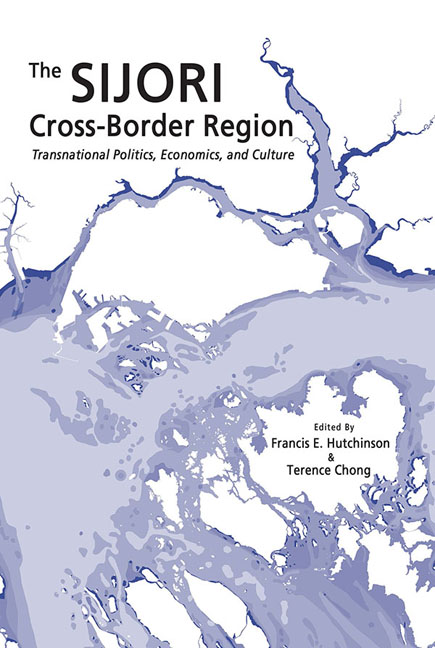Book contents
- Frontmatter
- Contents
- List of Maps
- List of Tables
- List of Figures
- Foreword
- Acknowledgements
- Contributors
- Abbreviations
- Introduction
- Section I Understanding the Whole
- Section II Policy and Politics
- Map3
- 4 The Social Construction of Comparative Advantage and the SIJORI Growth Triangle
- 5 The Political Economy of Closer Relations: A Perspective from Singapore
- 6 A Periphery Serving Three Cores: Balancing Local, National, and Cross-Border Interests in the Riau Islands
- 7 Political Contestation in Iskandar Malaysia: Views on Economic Integration during Malaysia's 13th General Election
- 8 Johor Survey: Interethnic Dissonance
- Section III Cross-Border Social and Cultural Communities
- Section IV Formal and Informal Economies
- Conclusion
- Appendix
- Sources for the SIJORI Maps
- Index
7 - Political Contestation in Iskandar Malaysia: Views on Economic Integration during Malaysia's 13th General Election
from Section II - Policy and Politics
Published online by Cambridge University Press: 22 July 2017
- Frontmatter
- Contents
- List of Maps
- List of Tables
- List of Figures
- Foreword
- Acknowledgements
- Contributors
- Abbreviations
- Introduction
- Section I Understanding the Whole
- Section II Policy and Politics
- Map3
- 4 The Social Construction of Comparative Advantage and the SIJORI Growth Triangle
- 5 The Political Economy of Closer Relations: A Perspective from Singapore
- 6 A Periphery Serving Three Cores: Balancing Local, National, and Cross-Border Interests in the Riau Islands
- 7 Political Contestation in Iskandar Malaysia: Views on Economic Integration during Malaysia's 13th General Election
- 8 Johor Survey: Interethnic Dissonance
- Section III Cross-Border Social and Cultural Communities
- Section IV Formal and Informal Economies
- Conclusion
- Appendix
- Sources for the SIJORI Maps
- Index
Summary
INTRODUCTION
A closer Johor-Singapore economic integration via the Iskandar Malaysia (IM) project has been of high concern to policymakers on both sides of the Causeway. The economic ties between Johor and Singapore date back to the Sultanate of Johor and the colonial era when the former was a key hinterland region with its Singapore-controlled pepper, gambier, rubber and then oil palm plantations (Luraschi and Wruck 2013). Singapore was, along with Johor, part of a group of entities colonized by the British in the Malayan Peninsula. In 1946, while still under colonial rule, Singapore and Malaya — which included Johor — were separated. They were briefly united in the independent Malaysian Federation from 1963 to 1965. In 1965, Singapore separated from Malaysia, thus ending its directly shared history with Johor. An international border plus a twenty-year frosty relationship of the Mahathir-Lee Kuan Yew core period slowed cross-border supply-chain developments and other investments between the two countries. However, during Malaysia's industrialization phase in the 1970s, Singaporean FDI was an important source of funds, with Johor hosting a series of infrastructure works and industrial clusters (Yeung 1998). Thus, economic linkages between Johor and Singapore continued but until recently, there has been a lack of high-key, big transboundary investments by large Malaysia and Singapore private sector companies, including their market-dominating government-linked corporations.
Up until the recent 2007–08 Global Financial Crisis, Malaysia implemented somewhat competitive policies in relation to Singapore. In Johor, projects aiming to steal traffic from Singapore's port include: Tanjung Pelepas, competing over container terminals with the Port of Singapore Authority; and long-hoped-for competition over oil storage and petrochemicals. This includes the on-hold Asian Petroleum Hub which is now on firmer footing via the new Petronas Refinery and Petrochemical Integrated Development (RAPID) project inclusive of the Dialog oil storage terminals and deep-water berthing in Pengerang at the southeastern tip of Johor. However, after nearly twenty years of stop-start projects, punctuated by two major financial crises, the latest Johor policies take on a new cooperative stance with Singapore. This seems to be taking root, engendering confidence among private sector investors from the two countries and beyond. The Iskandar economic corridor story has caught their attention, and the region is abuzz with big property projects and investments in the healthcare, education and tourism sectors.
- Type
- Chapter
- Information
- The SIJORI Cross-Border RegionTransnational Politics, Economics, and Culture, pp. 181 - 206Publisher: ISEAS–Yusof Ishak InstitutePrint publication year: 2016

